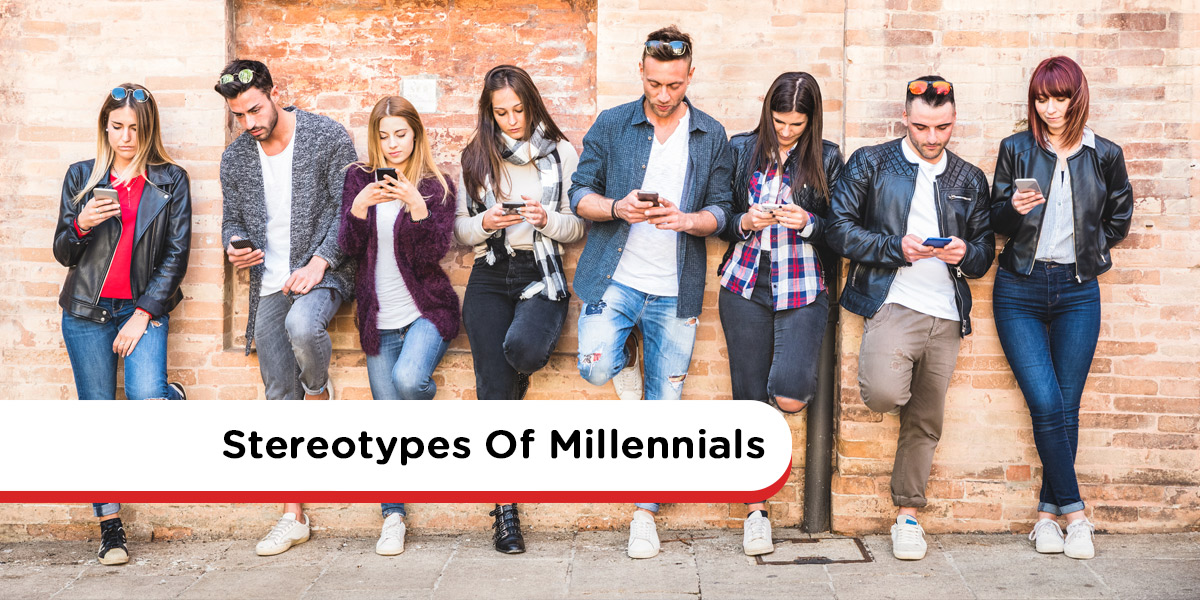
Your New Intranet Starts Here
Streamline communication, boost collaboration, and empower your team with MyHub's intuitive intranet solution.
Book a live demo now and experience the difference.
Take a Quick TourLet’s face it, millennials often get a bad rap. The media tends to portray them as lazy, entitled job hoppers who are easily distracted by technology. However, these labels don’t paint the full picture. Defined as those born in the 1980s and 1990s, millennials now make up the largest segment of the US workforce, accounting for up to one-third of all working adults. So what should employers really know about millennial stereotypes? In this post, we explore the most common assumptions and whether they hold any truth. We’ll also consider what this means for businesses looking to engage and retain millennial talent.
Millennial Characteristics: Myths vs. Reality
1. Millennials Are Lazy
One of the most persistent millennial stereotypes is that they’re lazy and lack a solid work ethic. But is this perception fact or fiction? The idea that younger generations are less driven is not new – almost every generation has faced similar criticism from those that came before.
In reality, millennials are not lazy – they simply operate with a different mindset. Traditional notions of a 9-to-5, deskbound workday with rigid hierarchies don’t align with how millennials view productivity. This generation prioritizes outcomes and flexibility over micromanagement and outdated protocols.
Millennials in the workplace tend to value autonomy and purpose. They thrive in environments that encourage collaboration, innovation, and creative problem-solving. Their strong digital skills and ability to adapt quickly make them highly effective in agile and tech-driven workplaces.
For employers, the key is to empower millennial employees rather than restrict them. Avoid micromanagement and instead give them room to think critically, contribute ideas, and work toward clearly defined goals. This approach can unlock their full potential and boost team performance.
2. Millennials Are Technology Obsessed
Another common assumption is that millennials are overly attached to their phones and social media. Whether it’s scrolling through Instagram or playing mobile games like Candy Crush, some worry that millennial tech habits are a distraction in the workplace.
There’s no denying that technology is central to their daily lives. As the first generation of digital natives, millennials grew up surrounded by computers, smartphones, and the internet. But this doesn’t mean they’re unproductive – in fact, their tech-savviness can be a major asset.
Modern businesses rely heavily on digital tools, platforms, and communication technologies. Millennials’ fluency in these areas means they often bring efficiency, innovation, and connectivity to the table. Rather than being a weakness, their tech proficiency can drive business growth and digital transformation.
Additionally, leveraging social media and online platforms to research competitors, follow trends, or network professionally should be encouraged. These digital behaviors can directly contribute to improved performance and strategy.
Of course, if an employee – millennial or not – is misusing company time, that’s a performance issue to be addressed on an individual basis. But broadly speaking, embracing the strengths millennials bring – especially their comfort with digital tools – can offer companies a significant competitive edge.
3. Millennials Prioritize Social Responsibility
There is a widespread perception that millennials are more socially conscious than previous generations. Topics like climate change, environmental sustainability, and workplace ethics are not just buzzwords – they’re core values for many millennials.
Fact or fiction? Research strongly supports this stereotype. For instance, a recent study revealed that 90% of millennials consider working for a sustainable company important, compared to just 77% of Baby Boomers. Another survey found that 81% expect companies to publicly commit to corporate social responsibility.
For employers, the implications are clear: aligning your brand with ethical practices and sustainability is not only a smart recruiting strategy – it’s also essential for winning the loyalty of the largest generation in the U.S. workforce. With 73 million millennials now forming the largest consumer group, incorporating sustainable business practices can also give you a major edge in the marketplace.
Moreover, when it comes to attracting top talent, a strong ethical brand identity can significantly increase your appeal. Millennials are increasingly choosing employers based on purpose-driven values over financial compensation. According to Forbes, this generation wants to work for companies that are making a positive impact on the world.
4. Millennials Frequently Change Jobs
The stereotype that millennials are job-hoppers suggests they’re disloyal and quick to leave a job for better opportunities. Many believe millennials lack long-term commitment to employers.
Fact or fiction? Research supports part of this view. According to Gallup, millennials are three times more likely than previous generations to change jobs within a year. Additionally, 60% say they are open to new job opportunities – 15% more than non-millennials.
But it’s not just about disloyalty. Millennial job mobility often reflects ambition, flexibility, and a desire for professional growth. Many millennials are still early in their careers and less tied down by family obligations or financial burdens like mortgages. For employers, this means creating clear career development paths and offering growth opportunities is key to improving retention.
5. Millennials Expect Quick Advancement
The media often labels millennials as the ‘me generation’ – supposedly entitled, impatient, and unwilling to ‘pay their dues’ in the workplace. This stereotype implies that millennials expect to climb the career ladder faster than previous generations.
Fact or fiction? There’s little concrete evidence to support the idea that millennials feel overly entitled. In fact, similar criticisms were directed at Generation X and Baby Boomers during their youth. What may be perceived as entitlement is often a reflection of a generation eager to make meaningful contributions and grow professionally – faster than traditional hierarchies may allow.
Instead of dismissing these ambitions, forward-thinking companies can tap into them by offering structured mentorship and growth opportunities that reward innovation, drive, and results.
6. Millennials Crave Praise and Recognition
Another common assumption is that millennials constantly need validation. Critics argue that a generation raised by helicopter parents has developed a so-called “participation trophy mindset”.
Fact or fiction? While millennials do value feedback, they’re not unique in this regard. Most employees, regardless of age, respond positively to recognition and encouragement.However, employee engagement is closely tied to regular feedback, which improves motivation, productivity, and overall business performance.
Rather than seeing this as a negative, companies should cultivate a culture of recognition. Encouraging both praise and constructive criticism benefits every generation in the workplace – not just millennials.
7. Millennials Have Evolved Career Goals and Ambitions
Millennials are often portrayed as having different career aspirations compared to older generations. This stereotype largely stems from the observation that millennials change jobs more frequently and tend to have shorter tenures with employers. The traditional ideal of job security and a lifelong 9-to-5 career with a single company is no longer a primary aspiration for many within this demographic.
Fact or fiction? There’s no denying that workplace expectations have evolved. The rise of flexible work arrangements, remote working, and the expanding gig economy have been more readily embraced by millennials than previous generations. According to Deloitte research, millennials are leading participation in gig and freelance work. In fact, of the projected 42 million self-employed workers in the US, 42% are expected to be millennials.
However, there’s no evidence suggesting that millennials are any less driven than older cohorts. They have simply adapted to technological advancements and are leveraging new opportunities to shape their careers on their own terms.
Understanding the Impact of Stereotypes on Millennials
Most employers today recognize that generational stereotypes are often exaggerated. Still, it’s essential for millennial professionals to be aware of these perceptions to better navigate the workplace and present themselves effectively.
For instance, when engaging with a Baby Boomer manager, take the time to explain that regularly checking platforms like Twitter is not merely a distraction. It’s a valuable method for real-time industry monitoring and staying updated on competitive trends and thought leadership in your field.
Similarly, if you’re considering a request for remote work, first demonstrate your value. Set clear performance goals and measurable outcomes to show accountability to both supervisors and team members.
Awareness of workplace stereotypes allows millennial employees to better understand the expectations and behaviors of their colleagues. This emotional intelligence can significantly enhance job performance and team collaboration.
How Employers Can Benefit from Millennial Strengths
While stereotypes can be misleading, some generational traits can be strategically leveraged. For example, millennials are notably more tech-savvy than previous generations. Employers can tap into this advantage by involving them in digital transformation projects or emerging tech initiatives.
In addition, understanding the millennial desire for continuous feedback and recognition can inspire the creation of an employee recognition program. Such a program boosts engagement and overall workplace satisfaction across all age groups.
Rather than viewing job-hopping as a drawback, employers could involve millennials in developing a robust wellness program or career development plan. This can increase staff retention and promote a healthier workplace culture.
Millennials Expect Business to Align with Their Values
One’s for sure: Millennials are more likely than previous generations to support – and spend with – brands that align with their ethical values and social responsibility standards.
This means that if a company fails to match millennial expectations regarding sustainability, ethics, or even political transparency, these employees will not hesitate to seek employment elsewhere. This generational shift in mindset is far more significant for employers to understand and adapt to than any stereotype.
Organizations that want to thrive must look beyond generational clichés and instead focus on building a purpose-driven culture that appeals to modern workers – especially millennials. Doing so not only enhances recruitment and retention but also strengthens long-term business performance.
FAQ Section
Are Millennials truly less committed to their jobs?
While some Millennials may change jobs more frequently, many seek long-term career growth and are committed to organizations that align with their values and offer opportunities for advancement.
Do Millennials lack a strong work ethic?
No, Millennials are often characterized by their adaptability, tech-savviness, and desire for meaningful work. They value flexibility, continuous learning, and work-life balance.
How can employers effectively engage Millennial employees?
Employers can engage Millennials by offering opportunities for professional development, fostering a culture of continuous learning, and providing a work environment that supports work-life balance and aligns with their values.


